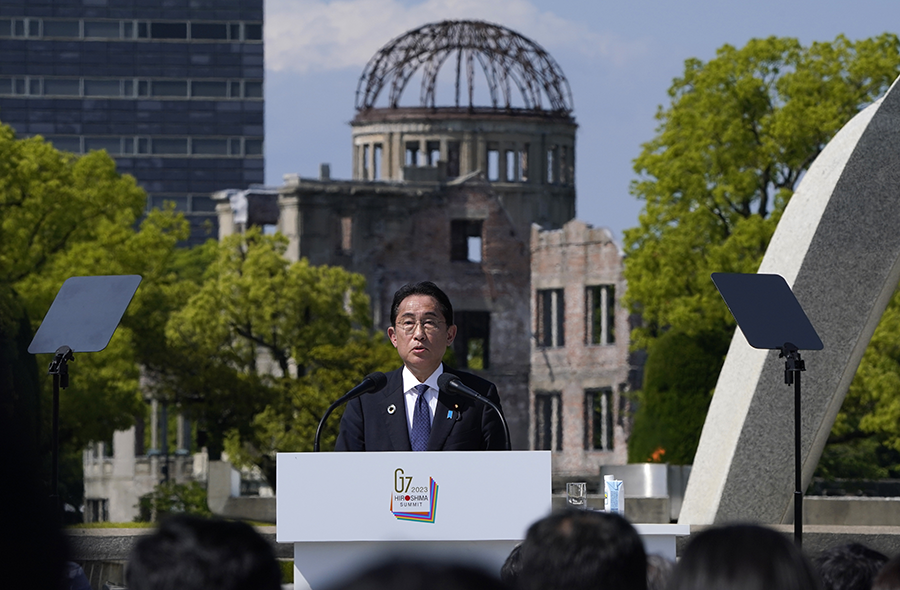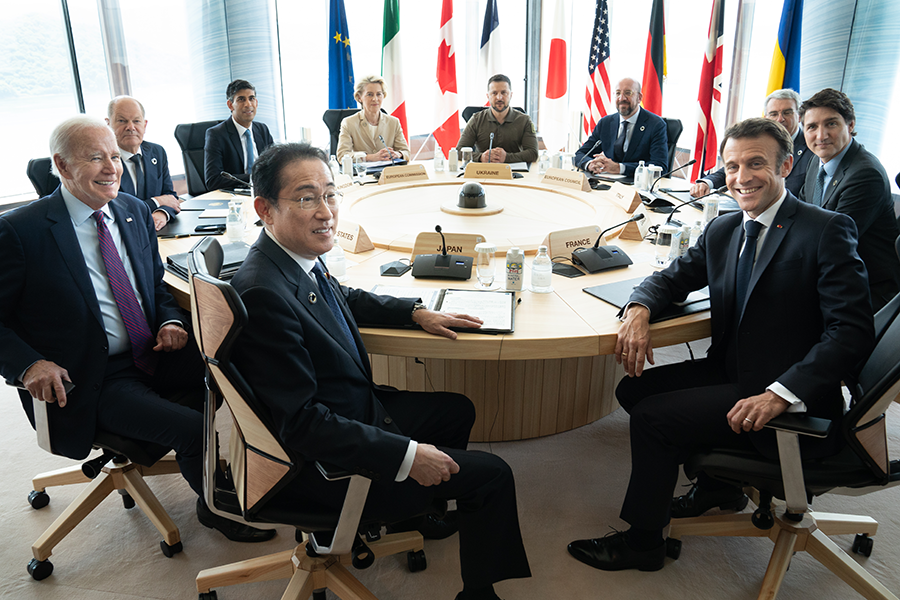G-7 Leaders Confront Human Cost of Nuclear War
June 2023
By Daryl G. Kimball
The leaders of the Group of Seven (G-7) industrialized nations opened their three-day summit May 19-21 with a joint visit to the museum in Hiroshima documenting the devastation caused by the surprise U.S. atomic attack on Aug. 6, 1945, and paid tribute to the hundreds of thousands of victims of the bombing.
 Later that day, they issued the first-ever G-7 joint statement on nuclear disarmament matters, which “underscored the importance of the 77-year record of non-use of nuclear weapons” and reaffirmed their “commitment to achieving a world without nuclear weapons with undiminished security for all.”
Later that day, they issued the first-ever G-7 joint statement on nuclear disarmament matters, which “underscored the importance of the 77-year record of non-use of nuclear weapons” and reaffirmed their “commitment to achieving a world without nuclear weapons with undiminished security for all.”
Japanese Prime Minister Fumio Kishida, who represents a Hiroshima constituency, chose the city as the location of the meeting to elevate nuclear disarmament on the global agenda at a time when global leaders and experts are warning of growing nuclear dangers.
“Conveying the reality of the nuclear attack is important as a starting point for all nuclear disarmament efforts.” Kishida told reporters on May 15, ahead of the summit.
But concerns have been building. As UN Secretary-General António Guterres said at the 2022 review conference of the nuclear Nonproliferation Treaty (NPT), “Today, humanity is just one misunderstanding, one miscalculation away from nuclear annihilation.” Last November, after Russian President Vladimir Putin threatened to use all means at his disposal to defend Russia and the territory it seized in Ukraine, U.S. President Joe Biden declared that the world faced the most dangerous nuclear moment since the Cuban missile crisis.
Kishida and his wife, Yuko, greeted the other G-7 leaders as they arrived at the city's Peace Memorial Park and ushered them into the Hiroshima Peace Memorial Museum. According to the Japanese government, Kishida and Hiroshima Mayor Kazumi Matsui explained the exhibits, and the leaders heard the firsthand account of 85-year-old atomic bomb survivor Keiko Ogura.
Following a 40-minute tour, the G-7 leaders and Charles Michel and Ursula von der Leyen of the European Union filed out silently. They laid wreaths in honor of the atomic bomb victims at the cenotaph memorial, which contains the names of all 333,907 people whose deaths have been attributed to the Aug. 6 atomic bombing. Matsui read the memorial inscription, which says, “Let all the souls here rest in peace, for we shall not repeat the evil.”
According to the White House, Biden wrote in the museum guestbook, “May the stories of this Museum remind us all of our obligations to build a future of peace. Together—let us continue to make progress toward the day when we can finally and forever rid the world of nuclear weapons. Keep the faith!”
Although the summit discussions focused on countering Russia’s full-scale invasion of Ukraine and the group’s concerns about China’s growing economic and military influence, host country Japan succeeded in elevating the issue of nuclear disarmament on the G-7 agenda.
The most tangible result was the “G-7 Leaders’ Hiroshima Vision on Nuclear Disarmament” statement, which reaffirms their commitment to key NPT principles and criticizes China and Russia for undermining those principles.
Despite the powerful reminders of the horror of nuclear war, the statement fell short of the occasion and did not advance major new proposals or commitments designed to reverse dangerous trends, let alone achieve disarmament.
In contrast to a statement adopted at the Group of 20 leaders’ summit in November, which bluntly said that “nuclear weapons use and threats of use are inadmissible” and which at the time was endorsed by the G-7 states, the G-7 leaders in Hiroshima targeted their words more narrowly, choosing to condemn nuclear use and threats of use only by Russia in relation to its war on Ukraine.
The statement faulted “Russia’s irresponsible nuclear rhetoric, undermining of arms control regimes, and stated intent to deploy nuclear weapons in Belarus [as] dangerous and unacceptable.”
Japan had aimed for more. In January, Kishida told French President Emmanuel Macron that the leaders must “demonstrate a firm commitment to absolutely reject the threat or use of nuclear weapons.” Instead, they declared that “threats by Russia of nuclear weapons use, let alone any use of nuclear weapons by Russia, in the context of its aggression against Ukraine are inadmissible.”
The caveat was a result of the fact that the G-7, which includes three nuclear-armed states and four other states in defense alliances with the nuclear-armed states, exercise military strategies that involve the potential use of nuclear weapons in extreme circumstances or in retaliation for a nuclear attack. “Our security policies,” the statement says, “are based on the understanding that nuclear weapons, for as long as they exist, should serve defensive purposes, deter aggression and prevent war and coercion.”
The statement also urged that “[t]he overall decline in global nuclear arsenals achieved since the end of the Cold War must continue and not be reversed” and encouraged others to adopt nuclear stockpile transparency measures. It called on “China and Russia to engage substantively in relevant multilateral and bilateral forums, in line with their obligations under the NPT, including Article VI.” That article commits states-parties to “pursue negotiations in good faith on effective measures relating to cessation of the nuclear arms race at an early date and to nuclear disarmament.”
The leaders reiterated support for “the immediate commencement of long overdue negotiations of a treaty banning the production of fissile material for use in nuclear weapons or other nuclear explosive devices,” but failed to spell out a new strategy to break the diplomatic logjam at the Conference on Disarmament that has blocked these talks for years.
The leaders repeated the quarter-century-old refrain that bringing the Comprehensive Test Ban Treaty into force “is another urgent matter.” The United States is one of eight countries that still must ratify the 1996 agreement.
In a reference to North Korea’s advancing nuclear and missile programs and Iran’s growing capability to enrich uranium absent a return to compliance with the 2015 Joint Comprehensive Plan of Action, the leaders declared that “[a] world without nuclear weapons cannot be achieved without nuclear non-proliferation.”
Daniel Hogsta, interim executive director of the International Campaign to Abolish Nuclear Weapons, who was in Hiroshima with other civil society disarmament campaigners, welcomed Kishida's effort to focus attention on the risks of nuclear weapons, but criticized the statement for its lack of new proposals.
“Simply pointing fingers at Russia and China is insufficient,” Hogsta said on May 21. “We need the G-7 countries, which all either possess, host, or endorse the use of nuclear weapons, to step up and engage the other nuclear powers in disarmament talks if we are to reach [the] goal of a world without nuclear weapons.”
Representatives of the hibakusha were even less satisfied. “Nuclear weapons are an absolute evil that cannot coexist with humans,” said Jiro Hamasumi, an assistant secretary-general of the Japan Confederation of A- and H-Bomb Sufferers Organizations, at a May 21 press conference. “As a survivor of an atomic bombing, I am outraged,” he said, referring to the fact that the statement did not mention the survivors and backed the concept of nuclear deterrence.
Hiroshi Harada, a hibakusha and a former director of the sufferers’ organization, told National Public Radio that museum exhibits cannot possibly tell the whole story. “If we were to reproduce the situation of that time, no one, including myself, would be able to enter the museum,” he said.
Harada said he read the messages left by the leaders after their visit “but they were superficial. What we expect is not only their messages, but also their actions, after they return to their own countries.”
 In a joint appeal coordinated by the European Leadership Network and the Asia Pacific Leadership Network, more than 250 civil society leaders from more than 50 countries, including 26 former foreign and defense ministers and six former heads of state, called on Russia and the United States “to compartmentalize nuclear arms control.”
In a joint appeal coordinated by the European Leadership Network and the Asia Pacific Leadership Network, more than 250 civil society leaders from more than 50 countries, including 26 former foreign and defense ministers and six former heads of state, called on Russia and the United States “to compartmentalize nuclear arms control.”
The group urged Moscow and Washington to pledge “that they will not exceed the [New Strategic Arms Reduction Treaty] New START limits on deployed nuclear forces,” which thus far have not been violated, and pursue “good faith negotiations on a successor framework for New START before its expiration in 2026.”
At Kishida’s initiative, other key global leaders, including from Australia, Brazil, nuclear-armed India, Indonesia, and South Korea, joined the summit and visited the atomic bomb museum. Guterres also participated.
Indonesian President Joko Widodo told The Asahi Shimbun on May 18, “The Indonesian position is clear and firm. Nuclear weapons must be destroyed because they are a threat in the world.” Indonesia and Brazil are supporters of the 2017 Treaty on the Prohibition of Nuclear Weapons, which was not referenced in any official G-7 statement.
Ukrainian President Volodymyr Zelenskyy, another invitee, used the visit to seek further Western military aid to thwart Russia's assault on his country. He thanked Biden and other G-7 leaders for their support, including plans for the transfer of U.S.-made F-16 jets. Biden recently pledged to help train Ukrainian pilots to fly the aircraft.
Zelenskyy said Russia must abandon its “nuclear blackmail of the world.”
“It wouldn’t be fair to compare, but I would tell you sincerely that the pictures of Hiroshima in ruins reminded me of Bakhmut and other similar towns and settlements in Ukraine. They are also totally destroyed. There’s nothing there,” Zelenskyy said at a news conference after the meeting ended.
“The international community stands at a turning point in history, witnessing Russia's desire to unilaterally change the status quo by force,” Kishida said in summit closing remarks on May 21.
“The threat, much less the use, of nuclear weapons to change the status quo by force is not acceptable,” he added.
